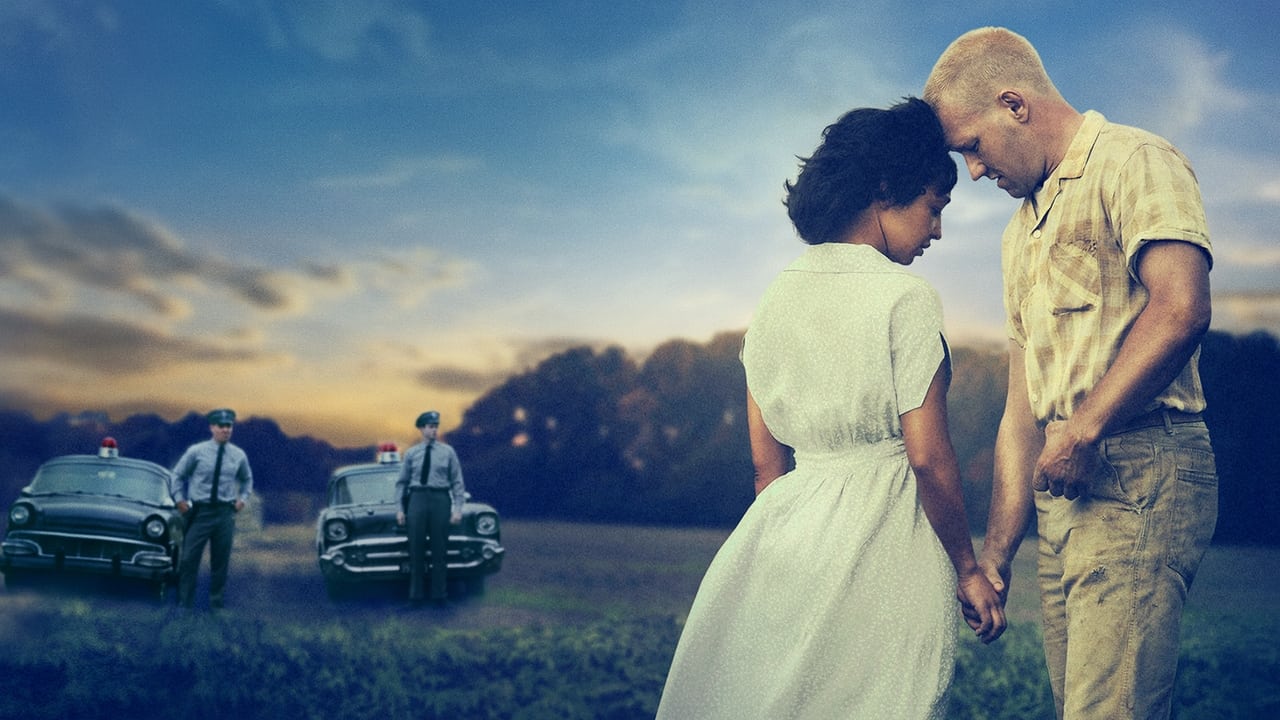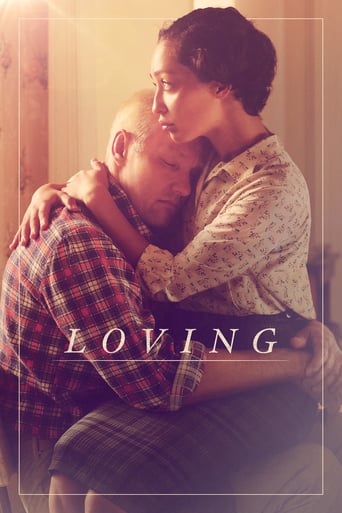

They finally got one right. How EASY it would have been to turn this into a formulaic triumph of justice over adversity. The story of a white man and his black wife in Virginia is waiting for stereotypes with open arms. The melancholic "Negro gospel music" and the heavenly choir at the end. There would be the sneers about "Nigger lovers," the chain of cars full of rednecks pursuing the frightened couple across a rural landscape, the shotgun blast through the window, the handsome Loving husband, the chic and beautiful Loving wife -- and the speeches! "We're not doing this for us; we're doing it or all mankind, and womankind too!" "Your honor, I love this woman. I'd do anything for her. I'd give my left testicle for her and I'd even think about giving up my dog."But no. It's a movie about lowbrow Richard Loving, a cigarette smoker (Gasp!), a brick layer, and his wife whose case was brought before the US Supreme Court and dramatically changed the laws governing freedom to marry, and it is straightforward and it's made for adults. The Lovings were married in Washington, DC, and returned home to Virginia in the late 50s, only to be arrested for committing interracial marriage. Nobody objected to Mildred being pregnant. That's okay. After all, boys will be boys and we know how blacks are. But -- marriage? The Constitution was written to protect the states from too much federal government, but the amendments passed during Reconstruction were designed to protect individual rights from any authority, including the state. There was a rush of forward-looking cases beginning in the 50s, that enhanced the liberty of individuals and protected citizens from state laws violating their rights. The general idea was based on John Stuart Mill's principle of harm. Will an act harm others? In the instance of interracial marriage, nope. And if it does cause harm to others? Well, then you have to take the social context into account. If the benefits outweigh the harm to others, then others will have to live with it. But things like heroin addiction are out.I was really impressed by every aspect of this film, except that the legal questions were glossed over. It was by no means a typical domestic drama. The casting is damned near perfect. Joel Edgerton, as Richard Loving, has a compellingly ugly face. It looks like it had too many encounters with boxing gloves. He'd make a good brutal villain in some package of action junk. And he's got the role of the quiet and inexpressive pater familias down pat. He doesn't have that many lines and his features are so immobile that when he gets drunk one night, under all kinds of stress and nattering from whites AND blacks, and releases a few hearty sobs, it comes as a catharsis. Ruth Negga is Mildred, the wife, and she's very appealing. As in the case of Richard, the actress who got the role is no Beyoncé. She's fragile, gracile, winsome, has two large and soulful eyes, and an endearing little smile. Together they look like the two people ahead of you in the supermarket checkout line.The supporting players are equally well cast and deliver credible performances. The ACLU lawyer is inexperienced, nervous, and dumb. Richard's Mamma, Sharon Blackwood, a part-time backwoods midwife, is garbed in such a way that her head just seems to have arisen on a thick stalk from between her shoulders. She doesn't approve of Richard's romance with Mildred but it's not immediately spelled out. We only know something is wrong between them because when we first see Richard returning home from work, he says, "Hi, Ma." Without looking at him, she replies, "Get some wood for the stove." It isn't until an hour into the story that she tells him the marriage was a bad idea, that he "should have known better." (The very words spoken earlier by the sheriff.) "I thought you liked Mildred." She stops and turns to him, saying in a deliberate tone, "I like a lot of people." A special award goes to Marton Csokas as the sheriff. He's clean-cut, stern, and not a fat, bald, slobbering mess. He issues orders with quiet authority, with the menacing implication that if you don't do what he says, he'll reach down your throat and pull out your pyloric sphincter.Not a big budget epic but a nice job by all concerned.
... View MoreIt's difficult to know where to begin with a film like this. It took nearly 60 years for someone to do this so I guess I would say that at least they took the time to get it right. It is an absolute work of art. And that deserves a lot of attention. But it's also, and primarily, a story about real people and the facts surrounding their lives. Specifically, their marriage. Marriage and raising children is difficult enough; just imagine what it would be like if someone like, say a policeman, stormed 300 years worth of systemic racism, segregation, and slavery, through it. Where this film succeeds so well is that it stays away from that larger picture, and that societal cauldron, and keeps the film focused on the two people at its center. They weren't worldly people. They weren't book smart. And their understanding of the world around them was simple enough to account only for the feelings they had for one another and not the artificial laws that would come to govern them for most of their marriage. I guess I would say that, ultimately, this film brings us into what felt like the real lives of Richard and Mildred Loving. The documentary on which this film is based, "The Loving Story" by Nancy Buriski, is a solid depiction of the actual characters. And Joel Edgerton and Ruth Negga are outstanding as the Lovings. Director/screenwriter, Jeff Nichols, keeps the story within the confines of the personal with barely a page of written dialogue for the lead actors. The quietness of their relationship says more than they, or anyone else, could say about them. And there is just enough from the peripheral characters for the viewer to feel the crushing fist of institutionalized racism as they did. I loved this film. The story is compelling and needed to be told from the perspective of its main characters and that was done very well here. The marriage of Richard and Mildred Loving was at the epicenter of one of the most consequential Supreme Court rulings of the 20th Century. A ruling that was unanimous during a time, unlike today, when that was actually possible. The strength of this film is in the touching scenes between the Lovings. Scenes of simplicity like putting your children to bed and then going off to your bedroom at the end of a long day. Richard's daily life was punctuated with monotonous hours as a brick layer where things are predictable and the lines are straight. That was something that he could understand and was comfortable with. Ruth's was one of children and home. That, and one another, was all they wanted. And all they needed. In 1967 the Supreme Court ruled that they should be left to the peace and comfort of a private life. And 60 years later someone made a terrific movie about them. Which is a lot better than not ever making it at all.
... View MoreThis movie is so busy trying to create a message and an emotion, that it misses the fact that this is based on a true story, so there's no need for Hollywood to create that. The scenes are choppy and don't lead to anything significant most of the time. They did do a commendable job of casting the lead character's to favor the real Mr. and Mrs. Loving. But, could have done a better job of finding biracial children to fit the characteristics of the Loving children. I also feel that this movie portrays Richard Loving's mother as being against her son marrying a "Colored" woman. However, in the HBO documentary "The Loving Story", his mother in clear in her approval of this marriage. And speaking of the documentary, I suggest that anyone wanting to know the true story and struggles of the Loving family, should watch it instead of this movie. There is no chemistry between the character's or with us FOR the character's in this movie. Watching this movie did nothing for me except make me want to re-watch the actual documentary.
... View MoreJoel Edgerton and Ruth Neggia give restrained performances in this film dealing with inter-racial marriage and bigotry and that's part of the problem here. Edgerton talks as if he has marbles in his mouth and Neggia's character of Mildred comes off much too nonchalant with the tremendous problem the inter-racially married couple face.Even when their case ultimately goes to the Supreme Court, we just hear the very generalized opening arguments by the Loving's attorneys. Even when the court reaches its decision, there is very little excitement upon the married couple's response.Am amazed that Ruth Neggia was nominated for a best actress Oscar and after seeing the film and her rather lackluster performance, there is no surprise that she lost.Even the racist police officers come off as rather blase here.
... View More